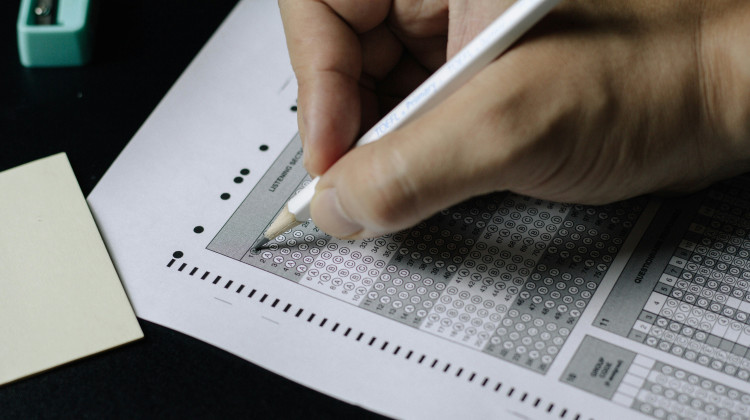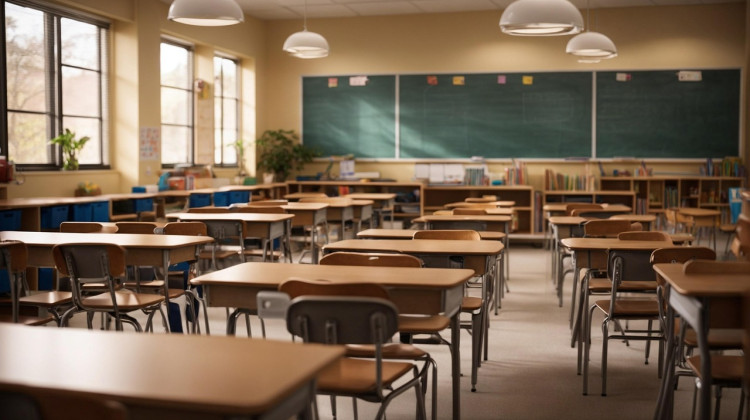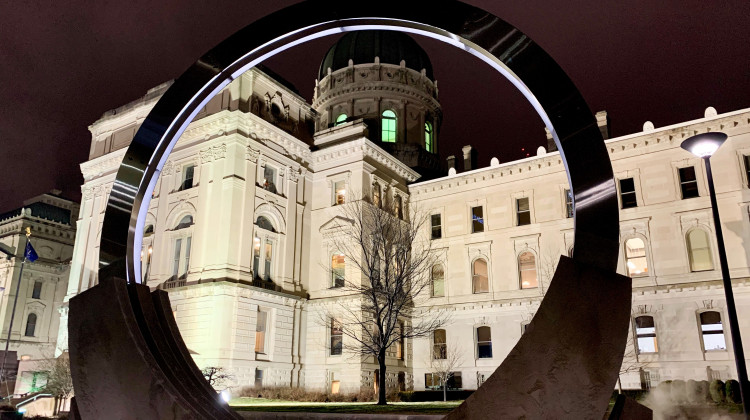
The Indiana Statehouse in downtown Indianapolis. The General Assembly's 2024 legislative session ends by March 14.
FILE PHOTO: IPB NewsLegislation intended to help families of students with disabilities navigate disputes over special education services with Indiana school districts appears to have failed in the General Assembly.
When schools and families disagree over special education services, parents can request something called a due process hearing — similar to a court case.
It’s also a traumatic and adversarial process for families and schools that can rack up hundreds of thousands of dollars in legal fees and destroy relationships between parents and district employees.
Language in House Bill 1380 would have shifted the burden of proof in due process proceedings from parents to schools in certain circumstances; that means districts would have to prove they provided an appropriate education to a student.
Currently in Indiana, and in most states, parents are required to prove to an independent hearing officer that the school hasn’t met their legal obligation to provide a free and appropriate education. Several states, however — including New York, New Jersey and Connecticut — place the burden on school districts.
The bill also included a provision that would have barred school districts from requiring parents to sign non-disclosure or confidentiality agreements as part of a special education settlement agreement. WFYI previously reported schools frequently request NDAs as a condition of a settlement.
House Bill 1380, which includes many unrelated components, passed out of the House with overwhelming support — 91-7. But lawmakers on the Senate Education and Career Development Committee passed an amendment last Wednesday that stripped the language pertaining to shifting the burden of proof and NDAs out of the bill.
They also added a provision that would make independent hearing officers — those tasked with overseeing and issuing a determination in due process hearings — state employees.
Debate among lawmakers, advocates
House Bill 1380 was authored by the powerful education policy maker Rep. Bob Behning (R-Indianapolis), who is also chairman of the House Education Committee.
During the Senate committee hearing on Feb. 14, Behning argued that the legislation would likely result in less litigation because it incentivizes both schools and families to participate in mediation and facilitated individualized education program meetings. He also said prohibiting NDAs in settlement agreements is about fairness.
Behning argued that barring schools from requiring families to sign NDAs would allow parents to talk with one another about the special education services their children receive, potentially identifying situations in which children with similar needs are receiving different levels of academic support.
But Sen. Dan Dernulc (R-Highland) expressed concern during the hearing that this legislation could negatively impact kids.
“I don't think it would negatively impact the kids — the flip of burden of proof, it actually is a huge benefit to the kids,” Behning responded.
“So what we're trying to do here is kind of square the tables a little bit more so that instead of me having to fight them, it's like, these are the services I want, you tell me why I don't should not be getting these services.”
Sen. Andrea Hunley (D-Indianapolis) told Behning she had heard concerns from districts about the elimination of confidentiality agreements or NDAs in special education settlements.
“And so they were saying that it could actually become problematic for the district if, say, one family was able to share that they got $300,000 when they settled, and another family got $600,000, and now we're sharing those financial amounts, and that that could really put the district, you know, at a financial risk,” Hunley said.
Behning said the intent of the legislation wasn’t to drive more money to families, but to get more services to students with disabilities.
“When I'm not able to disclose that I'm receiving this service to… my neighbor, to me, that's not fair to the other child,” Behning said.
Multiple organizations that represent the interests of school boards, administrators and teachers previously testified against the bill in both House and Senate hearings.
“I am greatly offended that we would ever consider adopting a provision that shifts the burden of proof from the one making the accusation to the one who's being accused. This is tantamount to being guilty until proven innocent,” said Joel Hand, a lobbyist for the American Federation of Teachers for Indiana and the Indiana Coalition for Public Education, during the Feb. 14 Senate committee hearing.
But advocates for children with disabilities testified in support of these measures. They explained that many families face an uphill battle in disputes over special education with schools; districts have more financial resources, expertise and readily available attorneys to fight claims that they aren’t providing students with services they’re entitled to under the law.
Cheryl Clemens with Decoding Dyslexia Indiana — a group that aims to raise awareness of the diagnosis — told lawmakers that typically parents file a due process request and hire legal counsel only after they’ve exhausted all other options. She said districts, given their power in these cases, are best positioned to bear the burden of proof.
“We also believe that families should not be silenced from sharing their stories,” Clemens said. “Instead, we as a state should seek to learn from our mistakes and put actions in place to ensure that we're not continuing to make the same mistakes.”
Contact WFYI education reporter Lee V. Gaines at lgaines@wfyi.org.
 DONATE
DONATE







 Support WFYI. We can't do it without you.
Support WFYI. We can't do it without you.